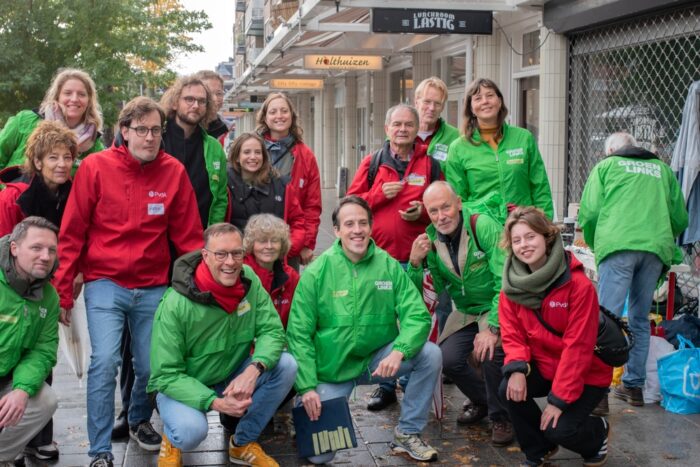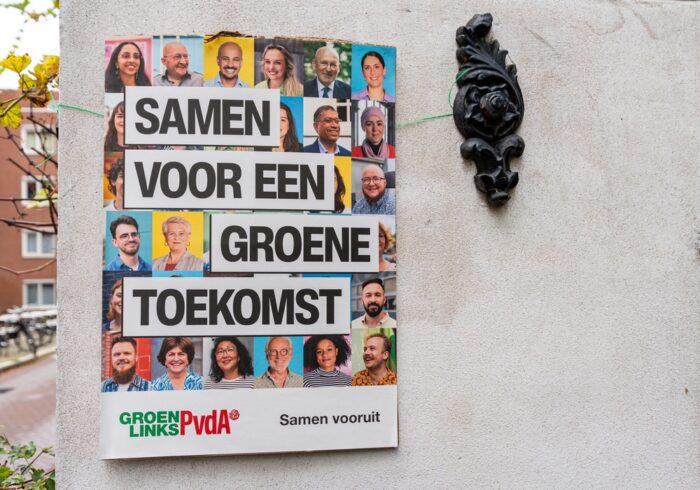Find all related Progressive Post
Progressive Post

In the parliamentary elections in Portugal, the Partido Socialista (PS) has suffered a heavy defeat, losing support from the middle classes as well as from young voters and pensioners. The challenge ahead is how to fight the rise of the populist radical right and to expand the basis of support of the left.
The 2024 Portuguese elections marked a significant shift to the right, signalling the end of the Socialist era in power and the dawn of a new chapter characterised by instability, a growing fragmentation and polarisation. With over eight years in government, the future of the PS hinged largely on its new leadership. Elected as the party’s new leader in December 2023, Pedro Nuno Santos – also known as the ‘Portuguese Pedro Sánchez’ – emerged as a prominent leftist figure within the PS after the formation of the ‘Geringonça’ (the alliance between the Socialists and the radical left between 2015 and 2019).
His campaign strategy revolved basically around competing with the Social Democratic Party (PSD, despite its name, a centre-right party) to attract centrist voters. However, Santos faced a daunting challenge. On the one hand, he could not disavow the party’s past, having been a key figure in the previous socialist government. On the other hand, he needed to advocate for change to counter the government’s dwindling popularity. To solve this dilemma, he adopted the slogan ‘action’ as the central theme of the socialist campaign, implying that the new leadership would invigorate government performance by expediting the implementation of key public policies and improving its efficacy. Additionally, the PS championed a traditional social democratic agenda, emphasising the strategic role of the state. This approach prioritised public investments in critical areas such as sustainable industries, research, knowledge production and economic internationalisation.
During the campaign, the PS faced intense criticism from both right and left-wing parties, serving as a focal point for various attacks. This scrutiny was particularly intensified due to the poor performance of public services, notably in critical areas like healthcare, education and transportation. Pedro Nuno Santos, in his role as Minister of Infrastructure during António Costa’s government, bore the brunt of criticism for the shortcomings in addressing these widespread grievances.
As anticipated by opinion polls, the election results underscored a significant haemorrhage of support for the Socialists. Despite efforts to regain traction, Santos failed to reconnect with middle-class voters who had supported the PS in the 2022 elections. Moreover, key demographics, such as pensioners and young voters, also shifted away from the party.
Overall, the new Socialist leader struggled to defend the legacy of Costa’s government while simultaneously presenting credible solutions that resonated with the electorate. Regarding the alliance strategy, there was ambiguity surrounding the PS’s stance towards the PSD, particularly the possibility of allowing a centre-right minority government to assume power.
While the PS maintained a socio-economic plan consistent with previous manifestos, advocating for the defence of the welfare state and public investments, the 2024 campaign witnessed a heightened polarisation regarding economic policies. Right-wing parties openly championed a more liberal economic agenda, advocating for a flat tax system and privatisations in key sectors, thereby challenging the traditional redistributive role of the state.
However, the Socialist leadership struggled to assert its agenda. Pedro Nuno Santos failed to effectively highlight the achievements of the PS government, including economic growth, reduced unemployment rates, and improved public finances, all buoyed by ambitious state investments funded by European funds. Concurrently, corruption scandals tarnished the image of Costa’s government and the credibility of the new socialist leader, likely contributing to the rise in support for the main far-right party (Chega). Furthermore, the right successfully framed the campaign discourse around cultural issues such as immigration, law and order, religion, and anti-gender parity laws, effectively shaping the agenda and diverting attention from the PS’s accomplishments.
The PS experienced a notable defeat, only mitigated by the lacklustre performance of the centre-right alliance (AD). Following the election, the PS leader declared the party’s intention to remain in opposition, categorically rejecting any cooperation with the right-wing parties. However, internal pressures within the PS may compel collaboration with the PSD to form a ‘cordon sanitaire’ against the populist radical right. This strategic dilemma poses a challenge to maintaining party unity and averting internal tensions.
The Socialist leader will likely seek an alliance with the radical left to counter the right’s momentum. Yet, maintaining some level of cooperation with the moderate right-wing party is essential for addressing longstanding issues such as judicial reform, infrastructure projects like the new airport and high-speed trains, as well as lobbying regulation. Amid an increasingly fragmented party landscape and critiques from the far-right Chega-party regarding a political deadlock, these reforms hold promise for restoring public confidence and government credibility.
Questions arise regarding Pedro Nuno Santos’ suitability to combat the ascent of the populist radical right, particularly amidst heightened polarisation and the rampant manipulation of public opinion through social media platforms. Furthermore, the socialist leader faces the challenge of defending and rejuvenating democratic institutions, which are increasingly under siege from anti-establishment populist forces.
Photo Credits: Partido Socialista
| Cookie | Duration | Description |
|---|---|---|
| cookielawinfo-checkbox-advertisement | 1 year | Set by the GDPR Cookie Consent plugin, this cookie is used to record the user consent for the cookies in the "Advertisement" category . |
| cookielawinfo-checkbox-analytics | 11 months | This cookie is set by GDPR Cookie Consent plugin. The cookie is used to store the user consent for the cookies in the category "Analytics". |
| cookielawinfo-checkbox-functional | 11 months | The cookie is set by GDPR cookie consent to record the user consent for the cookies in the category "Functional". |
| cookielawinfo-checkbox-necessary | 11 months | This cookie is set by GDPR Cookie Consent plugin. The cookies is used to store the user consent for the cookies in the category "Necessary". |
| cookielawinfo-checkbox-others | 11 months | This cookie is set by GDPR Cookie Consent plugin. The cookie is used to store the user consent for the cookies in the category "Other. |
| cookielawinfo-checkbox-performance | 11 months | This cookie is set by GDPR Cookie Consent plugin. The cookie is used to store the user consent for the cookies in the category "Performance". |
| csrftoken | past | This cookie is associated with Django web development platform for python. Used to help protect the website against Cross-Site Request Forgery attacks |
| JSESSIONID | session | The JSESSIONID cookie is used by New Relic to store a session identifier so that New Relic can monitor session counts for an application. |
| viewed_cookie_policy | 11 months | The cookie is set by the GDPR Cookie Consent plugin and is used to store whether or not user has consented to the use of cookies. It does not store any personal data. |
| Cookie | Duration | Description |
|---|---|---|
| __cf_bm | 30 minutes | This cookie, set by Cloudflare, is used to support Cloudflare Bot Management. |
| S | 1 hour | Used by Yahoo to provide ads, content or analytics. |
| sp_landing | 1 day | The sp_landing is set by Spotify to implement audio content from Spotify on the website and also registers information on user interaction related to the audio content. |
| sp_t | 1 year | The sp_t cookie is set by Spotify to implement audio content from Spotify on the website and also registers information on user interaction related to the audio content. |
| Cookie | Duration | Description |
|---|---|---|
| CONSENT | 2 years | YouTube sets this cookie via embedded youtube-videos and registers anonymous statistical data. |
| iutk | session | This cookie is used by Issuu analytic system to gather information regarding visitor activity on Issuu products. |
| s_vi | 2 years | An Adobe Analytics cookie that uses a unique visitor ID time/date stamp to identify a unique vistor to the website. |
| Cookie | Duration | Description |
|---|---|---|
| NID | 6 months | NID cookie, set by Google, is used for advertising purposes; to limit the number of times the user sees an ad, to mute unwanted ads, and to measure the effectiveness of ads. |
| VISITOR_INFO1_LIVE | 5 months 27 days | A cookie set by YouTube to measure bandwidth that determines whether the user gets the new or old player interface. |
| YSC | session | YSC cookie is set by Youtube and is used to track the views of embedded videos on Youtube pages. |
| yt-remote-connected-devices | never | YouTube sets this cookie to store the video preferences of the user using embedded YouTube video. |
| yt-remote-device-id | never | YouTube sets this cookie to store the video preferences of the user using embedded YouTube video. |
| yt.innertube::nextId | never | This cookie, set by YouTube, registers a unique ID to store data on what videos from YouTube the user has seen. |
| yt.innertube::requests | never | This cookie, set by YouTube, registers a unique ID to store data on what videos from YouTube the user has seen. |
| Cookie | Duration | Description |
|---|---|---|
| COMPASS | 1 hour | No description |
| ed3e2e5e5460c5b72cba896c22a5ff98 | session | No description available. |
| loglevel | never | No description available. |


